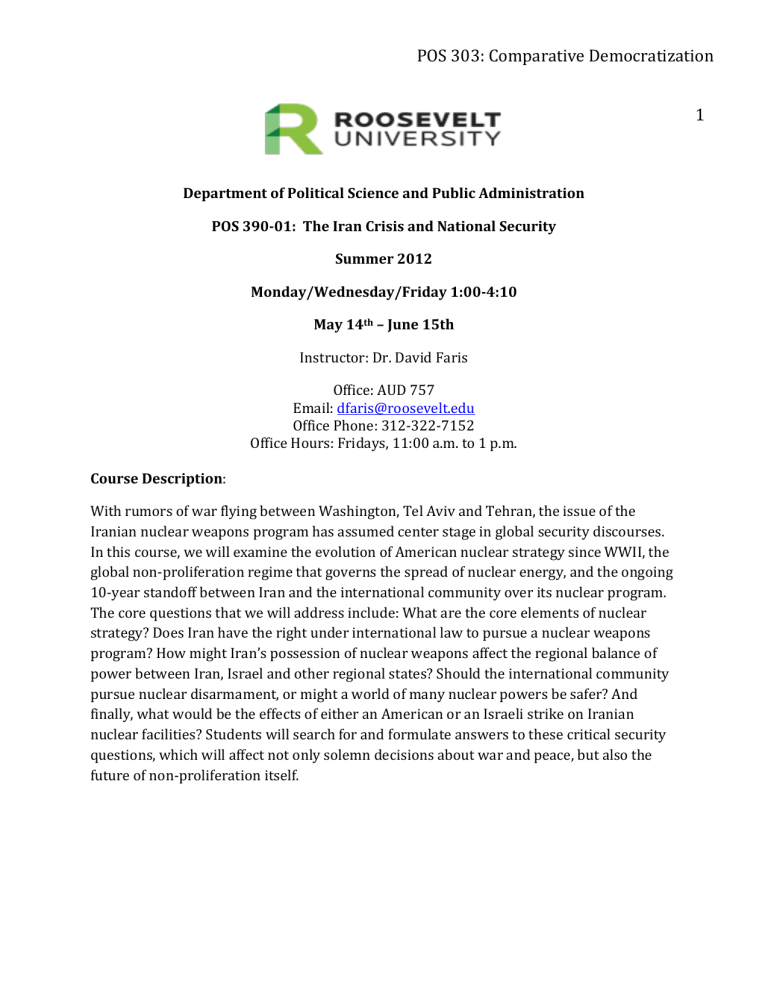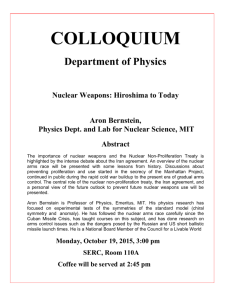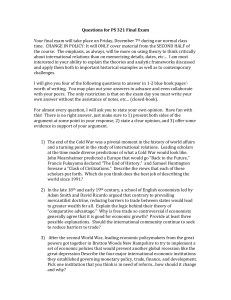: Power and Politics in the Middle East

POS 303: Comparative Democratization
1
Department of Political Science and Public Administration
POS 390-01: The Iran Crisis and National Security
Summer 2012
Monday/Wednesday/Friday 1:00-4:10
May 14 th – June 15th
Instructor: Dr. David Faris
Office: AUD 757
Email: dfaris@roosevelt.edu
Office Phone: 312-322-7152
Office Hours: Fridays, 11:00 a.m. to 1 p.m.
Course Description:
With rumors of war flying between Washington, Tel Aviv and Tehran, the issue of the
Iranian nuclear weapons program has assumed center stage in global security discourses.
In this course, we will examine the evolution of American nuclear strategy since WWII, the global non-proliferation regime that governs the spread of nuclear energy, and the ongoing
10-year standoff between Iran and the international community over its nuclear program.
The core questions that we will address include: What are the core elements of nuclear strategy? Does Iran have the right under international law to pursue a nuclear weapons program? How might Iran’s possession of nuclear weapons affect the regional balance of power between Iran, Israel and other regional states? Should the international community pursue nuclear disarmament, or might a world of many nuclear powers be safer? And finally, what would be the effects of either an American or an Israeli strike on Iranian nuclear facilities? Students will search for and formulate answers to these critical security questions, which will affect not only solemn decisions about war and peace, but also the future of non-proliferation itself.
POS 303: Comparative Democratization
Required Texts:
The following texts are available for purchase in the university bookstore.
2
1.
Siracusa, Joseph M. Nuclear Weapons: A Very Short Introduction. Oxford University
Press, 2008.
2.
Parsi, Trita. A Single Roll of the Dice: Obama’s Diplomacy With Iran. Yale University
Press, 2012.
3.
Schell, Jonathan. The Fate of the Earth and The Abolition. Stanford University Press,
2000.
Other readings will be posted to Blackboard well in advance of class.
Prerequisites: None
Attendance and Punctuality:
Because of the frequency of interactive activities and presentations, your presence in class is essential to the creation and maintenance of a collaborative learning environment. One absence will be forgiven. Further absences will be subtracted on a percentage basis directly from your final grade, unless excused by a note. For instance if you miss 4 total classes, you’ve missed roughly 33% of our class sessions, and the best grade you could possibly receive would be a 67 (D+). Students who miss 5 or more TOTAL classes will automatically fail or will be forced to withdraw from the course.
Students who arrive after roll is taken will receive half-credit for that day’s attendance;
Students arriving more than 45 minutes late are welcome to stay, but will receive no credit for that day’s attendance.
Crisis Policy
If you are experiencing difficulties with your health, personal life or any other crisis that is affecting your ability to come to class and complete the work, it is imperative that you alert me as soon as possible. The best path is to see someone at Roosevelt’s counseling center, who can then alert all your professors that you are having trouble.
POS 303: Comparative Democratization
Assignments
Position Papers: Each student will write two 1,800-2,200 word position papers on specific questions that arise from the material.
Presentations: Each class period, students will be assigned responsibility for leading part of our discussion of the readings. Each student will be responsible for one presentation/critical commentary.
3
Grading
Note: I reserve the right to adjust grades on the margin based on a shared understanding of your contribution to the group learning environment.
Position Paper #1 20%
Position Paper #2 25%
Position Paper #3: 35%
Presentations/Participation: 20%
University Policy on Absence to Observe Religious Holidays:
Roosevelt University respects the rights of students to observe major religious holidays and will make accommodations, upon request, for such observances. Students who wish to observe religious holidays must inform their instructors in writing within the first two weeks of the semester of their intent to observe the holiday so that alternative arrangements convenient to both students and faculty can be made at the earliest opportunity. See the student handbook for further details.
Class Schedule
Note: Readings are to completed before the class period for which they are assigned.
Week 1 -2: The evolution of nuclear strategy, disarmament and proliferation
Monday, May 14th
In-Class: Film Screening: Trinity and Beyond (selections)
Read: - Siracusa, 1-60
Wednesday, May 16 th
No class
Friday, May 18 th
POS 303: Comparative Democratization
No Class, Roosevelt closed for NATO summit
Monday, May 21st
No class, Roosevelt closed for NATO summit
Wednesday, May 23 rd
In-class: Film Screening: Fail-Safe
Read: Schell, (Prologue-180) : Siracusa, (complete); Wohlstetter, Alfred. “The Delicate
Balance of Terror.” Foreign Affairs, 1956 {BB}; Henry Kissinger “Force and Diplomacy”
Foreign Affairs Vol. 34 No. 3 (April 1956) {BB}
Friday, May 25th
4
In-Class: Film Screening: The Day After
Read: Schell, (181-finish); Robert Tucker, “The Nuclear Debate.” Foreign Affairs, Fall 1984
{BB}; Kenneth N. Waltz, “Peace, Stability and Nuclear Weapons” {BB}
Due: Position Paper #1:
Option A: Can Nuclear Weapons Be Abolished?
Option B: Is the world safer with nuclear weapons?
Week 3: The Regional Nuclear Puzzle
Monday, May 28 th
No class, Memorial Day
Wednesday, May 30th
In-Class: Film Screening: Israel’s Secret Weapon
Read: Barzegar, Kayhan. “Balance of Power in the Persian Gulf: An Iranian View.” Middle
East Policy 17.3 (September 2010): 74-87. {BB}; Weiss, Leonard. “Israel’s Future and Iran’s
Nuclear Program. Middle East Policy 16.3 (October 2009): 79-88. {BB}
Friday, June 1 st
Read: Ben-Meir, Alon. “Israel’s Response to a Nuclear Iran.” International Journal on World
Peace 27.1 (March 2010): 61-78; {BB} Eiland, Giora. “Israel’s Military Option.” The
Washington Quarterly 33.1 (January 2010): 115-130. {BB}
POS 303: Comparative Democratization
Week 4: Israel, the U.S. and the Iranian nuclear crisis
5
Monday, June 4th
In-Class: Film Screening: Iran and the West: Nuclear Confrontation (BBC)
Read: Parsi, Chapters 1-4; Mattair, Thomas R. “The United States and Iran: Diplomacy,
Sanctions and War.” Middle East Policy 17.2 (June 2010): 52-61. {BB}; Hersh, Seymour.
“Iran and the Bomb.” The New Yorker, June 6 th , 2011.
Wednesday, June 6th
Read: Parsi, Chapters 5-8
Friday, June 8 th
Read: Parsi, Chapters 9-12
Due: Position Paper #2:
Position Paper #2:
Option A: Should the Middle East Pursue a Path of Regional Disarmament?
Option B: Does Iran have the right to develop nuclear weapons?
Week 5: Wargames
Monday June 11th
Read: Kroenig, Matthew. “Time to Attack Iran: Why a Strike is the Least Bad Option.”
Foreign Affairs, Jan/Feb. 2012; {BB} Kahl, Colin H. “Not Time to Attack Iran: Why War
Should Be a Last Resort.” Foreign Affairs, Jan/Feb. 2012. {BB} Adamsky, Dina. “The War
Over Containing Iran: Can a Nuclear Iran Be Stopped?” Foreign Affairs, March/April 2011;
{BB}; Coll, Steve. “No Nukes.” The New Yorker. {BB}
Wednesday, June 13 th
NO CLASS Faris in DC for conference
Friday, June 15th
Read: Kreps, Sarah E. “Attacking the Atom: Does Bombing Nuclear Facilities Affect
Proliferation?” The Journal of Strategic Studies 34/2 (2011): 161-187. {BB} Etzioni, Amitai.
Rational Actors: Neither M.A.D. Nor Mad: The Meanings of Rationality, Rogue States and
Terrorism. Defense & Security Analysis 26/4 (December 2010): 31-38. {BB}; Seymour
Hersh, “A Strike in the Dark.” The New Yorker, February 11 th , 2008. {BB}
POS 303: Comparative Democratization
Due: Position Paper #3
Option A: Should the U.S. Lead an Attack on Iranian Nuclear Weapons Facilities?
6
Option B: Would the Region Be Safer With Nuclear Proliferation?
Important Notes:
*Students with disabilities may request special accommodations. Students must let me know within the first week of class if this is the case, and they also must contact Nancy
Litke in the Academic Success Center (312-384-3810).
* You must purchase or acquire the books for this class.
* You are responsible for your conduct in the class, and for alerting me to anything that might interfere with your ability to complete the class with a passing grade. There is a deadline for withdrawing from this class, and exceptions to that deadline will only be
granted in exceptional cases. In other words, waking up in mid-June and realizing you are going to fail because you didn’t do the work will not be a good enough reason for withdrawal.
*Students are required to abide by the University’s Code of Student Conduct. Students who plagiarize or cheat will receive a zero for the assignment and will be referred to the university for disciplinary action.
*Cell phones, mp3 players and other personal electronic devices must be switched off during class. You may use your laptop for note-taking, but students using their laptops for personal communication during class will be asked to stop.
*You cannot eat lunch during class. You can bring snacks.
*Enrolling in this course constitutes acceptance of these policies. I reserve the right to alter policies and scheduling on the syllabus and will give advance notice to students of any changes.





